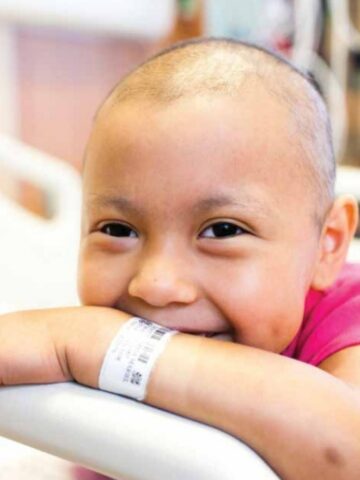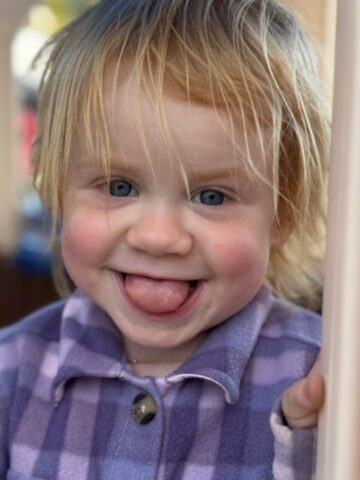CHOC Research Day 2024 held special significance for the CHOC community.
“On CHOC’s 60th anniversary,” said Kim Cripe, president and chief executive officer of CHOC, “we [came] together to celebrate research and the importance of ongoing discovery to the future of pediatric healthcare.”
The focus of CHOC Research Day 2024, held Nov. 20, was pediatric brain health.
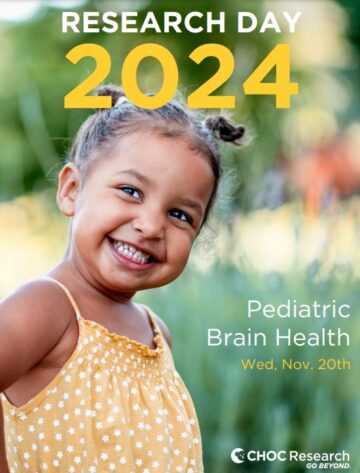
The day began with a keynote address from Dr. Eric Benner of the division of neonatology at Duke University, entitled, “Developing a Novel Treatment for Diffuse White Matter Injury in the Preterm Infant: A Clinician’s Perspective on Drug Development.”
One of the most common forms of perinatal brain injury involves damage to white matter (myelin). Dr. Benner’s laboratory has developed models of perinatal brain injury to investigate how the endogenous neural stem cell population responds to myelin injury.
The goal of Dr. Benner’s research is to develop innovative strategies to successfully redirect stem cells into the oligodendrocyte lineage and promote myelination after injury.
Work from the Benner laboratory has shown promising results with the use of oxysterols, oxidized forms of endogenous cholesterols. These molecules are extremely effective at penetrating the blood-brain barrier and appear to impact the fate specification of neural stem cells.
Collaborative efforts
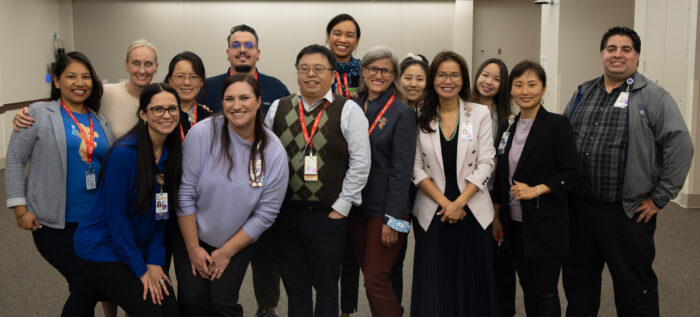
The first panel discussion, moderated by Brent Dethlefs, former executive director of the CHOC Research Institute who remains as a consultant, highlighted the collaborative efforts of diverse experts from CHOC and UCI in neonatal brain health research for optimizing pediatric neurodevelopmental outcomes throughout the lifespan.
The panel included conversations with Dr. Terrie Inder, a neonatologist and director of the Center for Neonatal Research at CHOC, and Dr. John Crawford, medical director of neurology at CHOC and co-medical director of the CHOC Neuroscience Institute, informed by insights before the panel from Dr. Peter Anderson, a research neuropsychologist at CHOC Research Institute and a Professor of Pediatrics at UCI School of Medicine.
Each panelist offered a unique perspective rooted in both clinical practice and research expertise.
The second panel discussion, moderated by neurosurgeon Dr. Michael Muhonen, brought together Dr. Mariko Sato, a pediatric oncologist at CHOC, and Dr. Maija-Riikka Steenari, a pediatric neurologist at CHOC, for a broad-ranging conversation on neurological and brain disorders, treatments, and innovations in pediatric care.
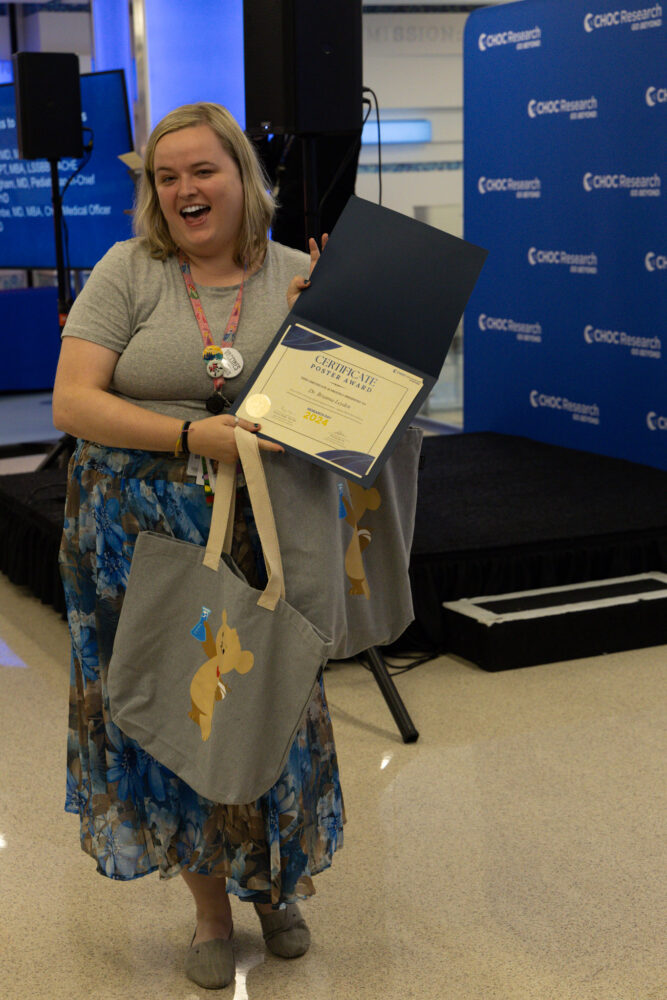
Throughout the day, attendees pored over 73 posters from research collaborations among 44 institutions. The research featured in the posters included basic, translational, and clinical research, as well as social studies.
Podium presentations
Dr. Carol Davis-Dao, research manager in the division of pediatric urology at CHOC and the department of urology at UC Irvine, moderated the following podium presentations:
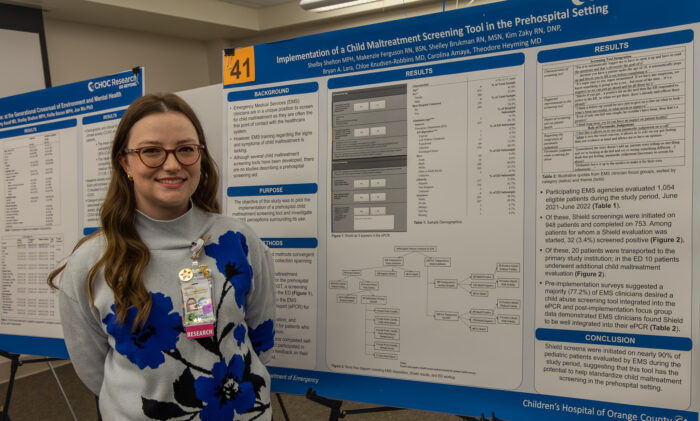
- Dr. Alexandra Latini: Tetrahydrobiopterin Metabolism is Impaired in DARS2 Deficiency A Machine Learning Approach for Predicting Care Transition Risk
- Dr. Radha Nagarajan: A Machine Learning Approach for Predicting Care Transition Risk
- Dr. Minodora Totoiu: Impact of Social Determinants of Health on Development of Children with Down Syndrome
- Dr. Pallabi Pal: Effects of Antisense Oligonucleotide for Treatment of VCP Disease
- Dr. Zoe Flyer: Pediatric Injuries from Electric Bicycles: Analyzing the Role of Speed in Injury Patterns
- Dr. Brianna Leyden: High Risk, Low Compliance: Surprising Post-Pandemic Influenza Vaccine Trends in a Children’s Hospital
- Dr. Jamie Janchoi: Unlocking Relief: Efficacy of PENFS in Alleviating Long COVID Symptoms in Children – A Pilot Feasibility Study
- Dr. Kristin Cheng: Nutrient Composition of Defatted Human Milk for Chylothorax and Very Long-Chain Acyl-CoA Dehydrogenase Deficiency
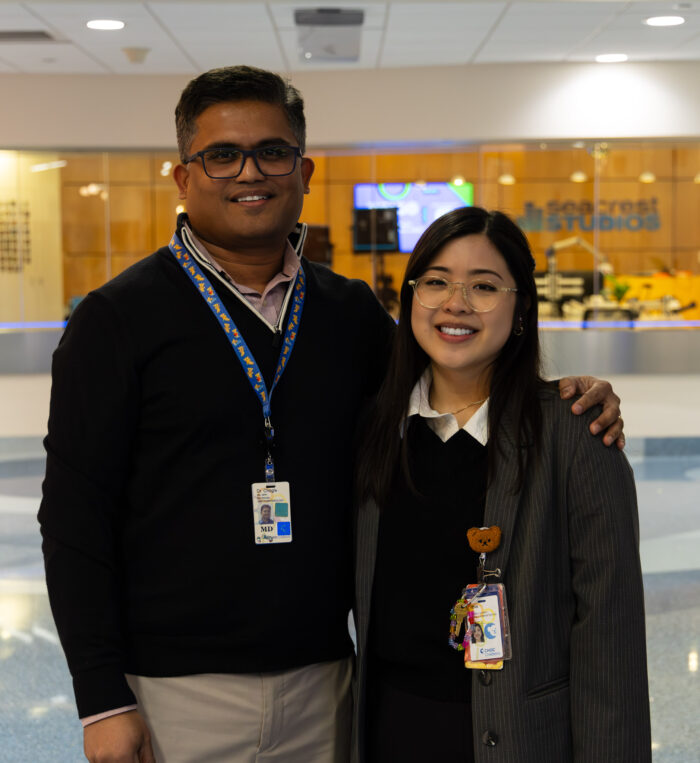
Fun and learning for kids
Research Day 2024 also featured a Kids Cracking Science Quest that consisted of a mini-lectures broadcast by Seacrest Studios and hands-on activities in the afternoon.
During the mini-lectures, patients and their families learned from UC Irvine’s Dr. Katharine Simon and her team about what happens to the brain during sleep, made friends with inhabitants of the mobile aquarium from Discovery Cube, and saw how robotics can be used for medical imaging with Dr. John Howell and his robot friend PiMICS.
The mini-lectures concluded with a demonstration of “elephant toothpaste” by staff scientists at CHOC that highlighted the results of chemical reactions.
The hands-on afternoon activities allowed patients and families the opportunity to interact with the morning presenters as well as learn about (and receive) brain-healthy snacks from CHOC’s clinical nutrition and lactation specialists, to practice brain surgery with CHOC’s Neuroscience Institute team, and to see how data is used to draw conclusions with a “Stats in Action” table hosted by the Research Institute’s biostatistics core.
The day culminated in competition across various departments of CHOC wherein participants tested their engineering skills in the first annual egg drop competition.
At the end of the day, awards were handed out to Security Team #1 for being the Fan Favorite (voted on by patients, families, associates, and others) and Plant Ops for being the overall champion, having engineered a device that safely secured its transited egg through two drops from the second floor of the Bill Holmes Tower to the first.
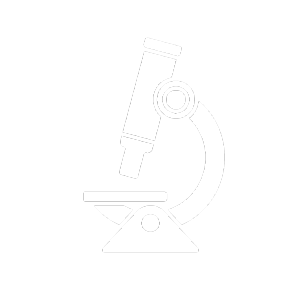
Learn about pediatric research and clinical trials at CHOC

